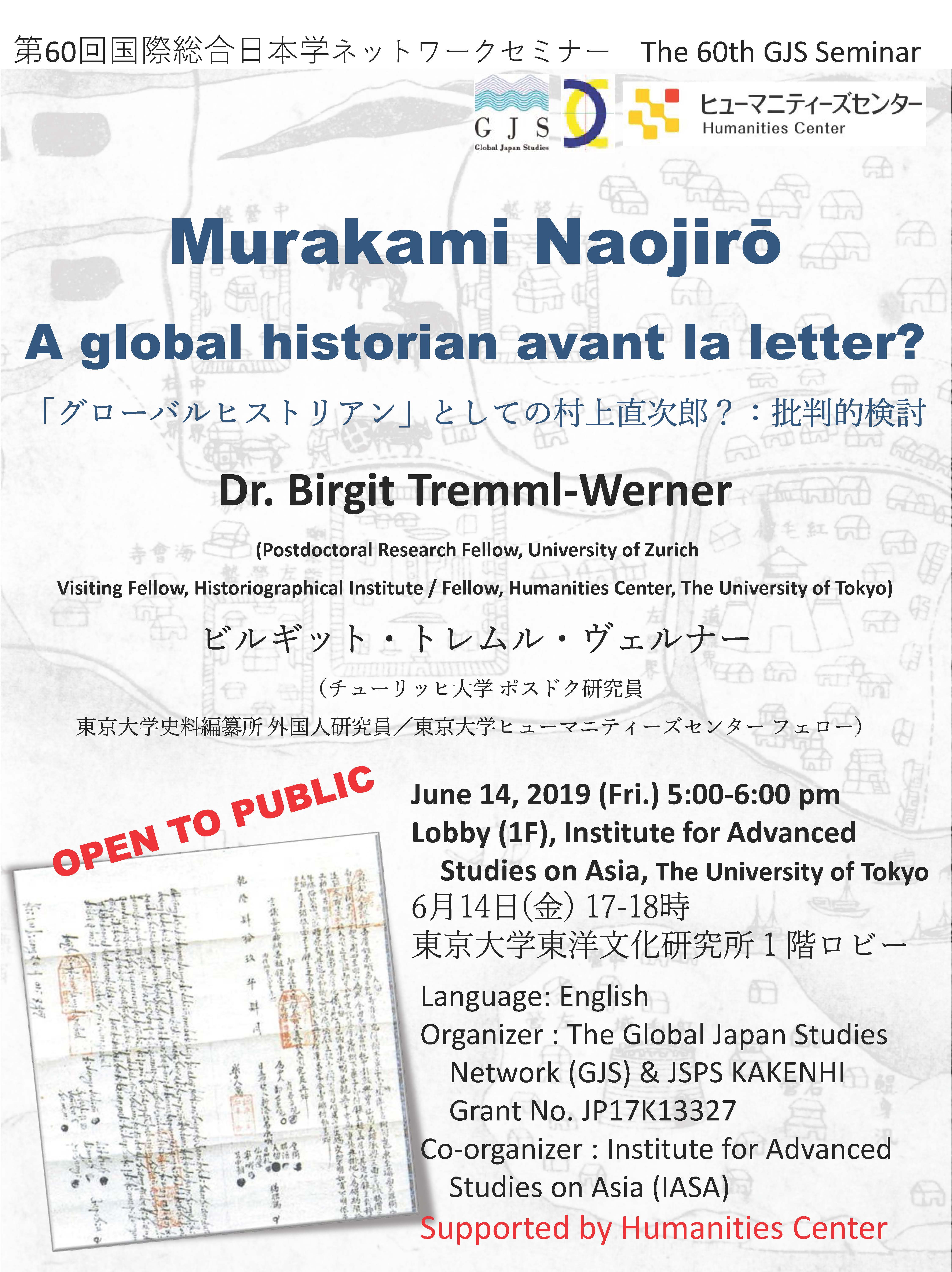The 60th GJS SeminarMurakami Naojirō: a global historian avant la letter?
| Date and time: | June 14, 2019 (Fri.), 5:00-6:00PM |
|---|---|
| Venue: | Lobby (1F), Institute for Advanced Studies on Asia, The University of Tokyo |
| Speaker: | Birgit Tremml-Werner (Postdoctoral Research Fellow, University of Zurich / Visiting Fellow, Historiographical Institute / Fellow, Humanities Center, The University of Tokyo) |
| Language: | English |

Abstract:
Murakami Naojirō (1868-1966) edited and published widely on Hirado and Nagasaki trade, introduced the accounts of diverse early modern European visitors to Japan and portrayed Japanese relations in the China Seas. His meticulous compilations of primary sources unearthed in Japan, Europe and Southeast Asia continues to provide global historians with abundant material to show connections. Murakami’s diverse publications not only shaped narratives about Tokugawa Japan’s early modern encounter with European trading nations and Tokugawa’s interest in trans-Pacific trade, but also more broadly on the framing of Southeast Asian pasts. The latter concerns both an overemphasis of Japanese impact on the region and ends with the marginalisation of Taiwan within it.
In my talk I will focus on Murakami’s ambivalent historiographical contributions to the history of early modern Taiwan. While Taiwan furnishes an opportunity to consider how indigenous pasts and encounters themselves played a role in redirecting historical narratives of global connections, Murakami’s dissemination of so-called Sinkan Manuscripts (Murakami 1897; 1933), contracts written in a local language using Roman script, are one example for these very connections. Equally to early modern foreign observers of Taiwan including Ming traveller Chen Di or Dominican friar Diego Aduarte, Murakami struggled to integrate the substance and sources of Taiwanese indigenous pasts into his existing grids of historical knowledge and ideas of social organisation. For instance, they all emphasized how indigenous communities provided local commodities for global exchange, mediated by Chinese or Japanese merchants. Yet, it is Murakami’s positioning of Taiwan’s past in his narration of early modern Japanese expansion that lastingly excluded the island from linear narratives of a history of connections in the China Seas. He implicitly viewed the lack of a central authority on Taiwan as a hindrance to its inclusion within narratives of macro-regional official foreign relations. This becomes most obvious in how he designed the curriculum of the Nan’yō shi (Southern Sea history) at the Imperial University in Taipei. By focusing on this “historiography of the other”, I use the case of Taiwan to challenge commonplace assumptions regarding pre-modern foreign relations and indigenous forms of social organisation in East and Southeast Asia on the one hand; on the other hand I will outline parallels between late Meiji historiographical thought and twenty-first century research in global history.
Pictures of GJS seminar
Co-organizer: Institute for Advanced Studies on Asia (IASA)
Supported by Humanities Center, The University of Tokyo
Contact: gjs[at]ioc.u-tokyo.ac.jp



